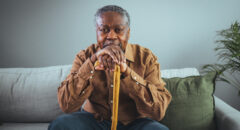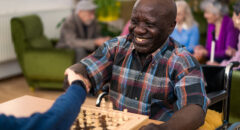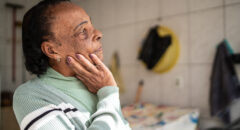
Nearly 40 percent of caregivers identify as Black, Indigenous, or People of Color (BIPOC) and can relate to the challenges that may come along with it. You may feel unsettled when your mother botches her favorite recipe. Then again, who hasn't confused tablespoons with teaspoons a few times? But as the months go on, she starts forgetting to turn off the burners. She puts salt in her coffee rather than sugar. And one day, she no longer remembers to eat. When Alzheimer's disease begins taking over the brain, even the most basic instincts aren't safe.
Proper nutrition is more important than ever
Confusion and forgetfulness about food are particularly troubling aspects of Alzheimer's disease, and they often mark the end of a person's independence. When a person has trouble preparing food -- or even recognizing it -- it's time for a caregiver to step in. Proper nutrition is more important than ever, and many Alzheimer's patients can't get it on their own. But your loved one needs more than just a cook. As the disease progresses, it will take an ever-growing supply of compassion and ingenuity to keep them well-fed.
Weight loss is one of the primary symptoms of Alzheimer's disease. Families should weigh their loved ones regularly, and doctors should do likewise. When a person with dementia starts to lose weight, it's a sign that he or she is not coping well with the disease.
Your first and foremost challenge will be overcoming the tricks Alzheimer's plays with appetite. A person can literally forget to be hungry, or, alternatively, may forget eating lunch 15 minutes ago and may want to have the meal again.
For this reason, it's very important to set up a regular mealtime and stick to it. If he or she wants to eat right after a meal, put out a plate of small snacks such as cheese cubes or a sliced banana.
RELATED: You Are Not Alone! A Message for Black Alzheimer’s Caregivers
When preparing and serving food, remember that people with Alzheimer's do best when making simple choices in a calm environment. Try serving foods that the person has always liked, and don't put too many different items on the plate at once. You may even need to serve each food separately. To help them stay focused on the meal, turn off the television and keep conversation to a minimum.
You'll need to make extra adjustments when coordination fades. Try serving finger foods, and forget about avoiding spills. Instead of insisting on neatness, give them an apron and put a plastic tablecloth on the table. Consider getting plates with suction cups and no-spill glasses. Even as the messes grow, it's important to let them feed themselves as much as possible.
As the disease progresses, people with Alzheimer's may start eating inappropriate things. In her book "When Alzheimer's Hits Home", Jo Danna describes a breakfast whipped up by her mother: A bowl of water mixed with instant coffee, two packets of Chinese mustard, and a glob of petroleum jelly. Other patients have been known to eat sponges, potting soil, and raw potatoes. If these problems arise, you'll have to keep such objects out of sight.
As long as the person with Alzheimer's is still eating, mealtime will continue to pose new challenges. Here are some more tips for helping her get the nourishment she needs:
- If he or she has trouble swallowing, serve soft foods or cut food into small pieces. If the problem persists, have them examined by a doctor.
- Make sure he or she drinks plenty of nonalcoholic, noncaffeinated liquids. (One cup of coffee, one cup of tea, or one can of caffeinated soda each day is okay.) Alzheimer's can cloud the sense of thirst as well as hunger. Don't be too rigid, though: As geriatricians point out, you may need to add a little of a favorite beverage such as coffee or gin sometimes to get your loved one to eat anything, so it's highly individual.
- If a person has dentures, check to make sure they fit correctly.
- Don't serve food or drinks that are too hot.
- If a person doesn't seem to be eating enough or refuses to eat a variety of foods, ask a doctor about nutritional supplements.
In the later stages of Alzheimer's, you or a caregiver will probably need to feed your loved one. Over time their brain may no longer send them the signals necessary to pick up and hold a spoon. At that point, he or she may not mind being fed. In fact, many Alzheimer's patients enjoy the closeness of mealtime and look forward to eating and talking or just being around their caregiver or loved one.
RELATED: Caregiver Confession: What It’s Really Like Living With Alzheimer’s Disease
Even with this assistance, however, they may begin to have trouble swallowing. Ask your doctor about thickeners you can add to water to make it much easier to swallow. Drinking through a straw or using a sippy cup will also help prevent choking.
But eventually, he or she may become completely incapable of eating a meal, no matter how much help and encouragement you provide. At this point, you face a very difficult decision: Do you have a feeding tube placed into their stomach, or do you let them live out their life without outside intervention? Feeding tubes are often painful and irritating, limit mobility, and are a source of infections; they're also associated with aspiration pneumonia. Feeding tubes often stop working because they clog, get infected, or are pulled out -- sometimes resulting in trips to the emergency room in the middle of the night. Sometimes caregivers ask for a short-term trial, with an agreement to pull the tube out after two weeks if it seems to cause pain and discomfort.
A tube may extend a person's life and possibly delay a move to a nursing home, but only you -- with the help of a physician -- can decide what's right. Many caregivers and doctors feel it is equally compassionate, if not more so, to let a loved one, aided by painkillers if necessary, live out his or her remaining life without tubes and outside interventions.








